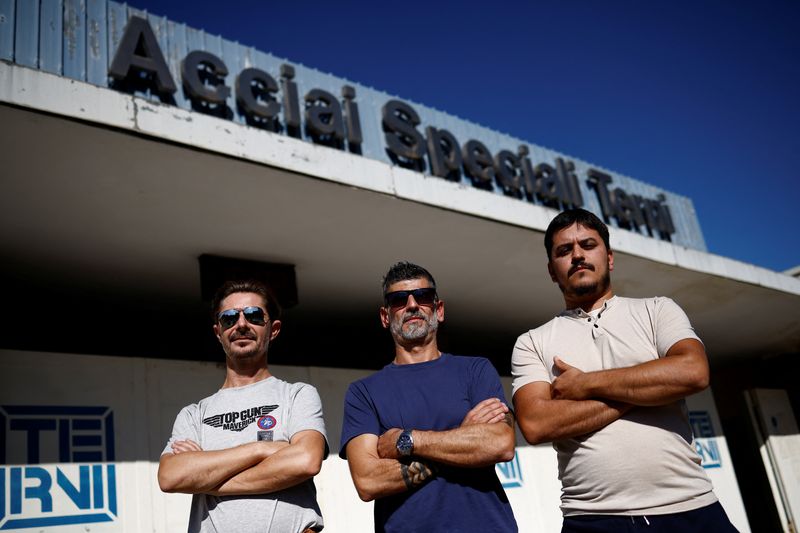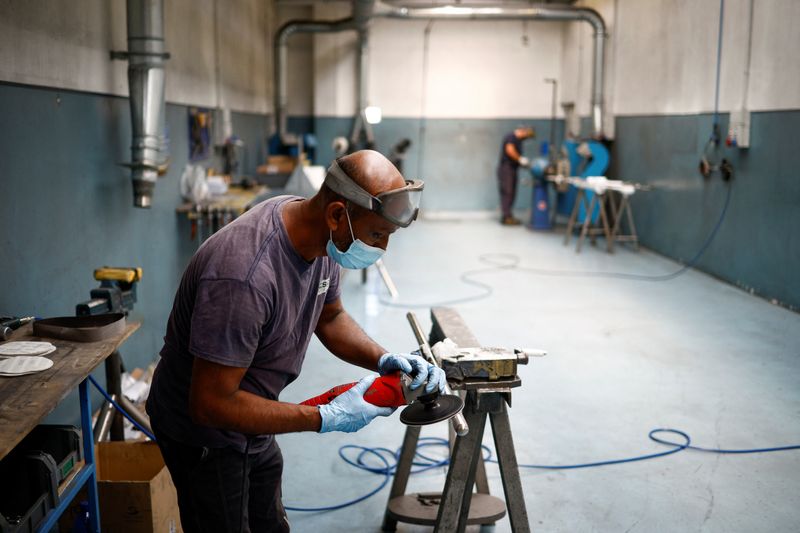By Gavin Jones and Angelo Amante
TERNI, Italy (Reuters) - Inflation, looming recession and impossibly high energy bills are among the daunting economic problems awaiting whoever wins Italy's election on Sunday, and they are casting a particularly long shadow over the industrial city of Terni.
According to Milan-based economic think-tank Cerved some 24.5% of Terni's 16,000 firms are at risk of bankruptcy in the near term, the second highest level of any place in the country after Crotone in the depressed southern region of Calabria.
Lying some 100 kilometres (62 miles) north of Rome, for more than a century the fortunes of Terni's 106,000 inhabitants have been closely linked to its main employer Acciai Speciali Terni, one of Italy's largest steel mills.
Crippled by soaring gas and electricity costs, last week the plant sent home 400 of its 2,278 workers on reduced pay until better times. The furloughed workers see little reason for hope.
"We already have our own energy problem at home with gas and electricity bills, so now we have a work crisis on top of a domestic crisis," said Igor Moresi who has worked at the plant for 22 years on machines coiling sheets of steel.
Italy's energy-guzzling steel sector has seen its costs rise tenfold since a year ago, according to data from the steel producers' lobby Federacciai.
As in most of Europe, it is not only energy prices that are hurting Italian firms and families. The overall inflation rate, exacerbated by the war in Ukraine, hit 9.1% in August to post the highest level since the EU-harmonised index was launched in 1997.
INSTABILITY
In common with most young Italians, job security has been a mirage for Jacopo Calabresi, 31, another worker sent home from Terni's steel mill. He was given temporary contracts for his first five years at the plant before finally getting a stable position just two months ago.
"After years of total uncertainty I had a short spell of tranquillity. Now of course I'm very worried again," he said.
Statistics bureau ISTAT says the number of temporary contracts stood in July at the highest since its records began in 1977. This prevalence of temporary, low-paid work drives thousands of young Italians to seek better prospects abroad.
The new energy and inflation crises come on top of chronic Italian problems such as weak growth, stagnant productivity, huge public debt, low employment, cloying bureaucracy and a snail-paced justice system.
If opinion polls are correct, after Sunday all these will fall into the lap of Giorgia Meloni, the leader of the nationalist Brothers of Italy party who looks set to become Italy's first ever woman prime minister.
Guido Crosetto, a close aide to Meloni and co-founder of her party, warned this month that the full impact of energy costs on the economy will be felt later in the autumn, potentially triggering widespread social unrest.
"It will be like Gotham City," he said, appealing for opposition parties to help the new government but ruling out another national unity coalition like the one led by outgoing Prime Minister Mario Draghi.
Meloni says she will push for Europe to set a cap on gas imported from Russia -- something Draghi has been trying in vain to do for months -- and she wants to break the link between domestic gas and electricity prices.
She pledges sweeping tax cuts while vowing to be "cautious" with public finances. Brothers of Italy's manifesto, like those of all Italy's main parties, offers little detail on how its policies will be financed.
RED TAPE
In the current situation even Terni's most successful companies are feeling the pinch.
Fratelli Canalicchio, which makes components for luxury boats, has been expanding ever since it was founded 30 years ago, but its co-owner Giovanni Canalicchio said there were mounting difficulties to overcome.
The price of steel has doubled over the last year, crimping profit margins, he said, while successive governments had failed to reduce the red tape that most Italian firms complain about.
"Other European countries have far less bureaucracy and that allows their businesses to be faster and more reactive to changes," he said in his factory of around 60 workers as they cut and shaped the steel parts for yachts.
"How do I see the economic situation of the country? Honestly it's not very rosy."
Meloni has targeted much of her campaign at Italy's small and medium-sized firms like Canalicchio's, and while he did not reveal who he would vote for on Sunday, the businessman said he could understand her popularity.
"She's the only one who has done what she said, staying in opposition and not taking part in Draghi's unity government, so hers is the only party that stands out from the rest," he said.
Around 5 kilometres down the road, Coppini, a family-run firm with 23 workers, has been producing another Italian speciality, olive oil, since 1955.
Its CEO Micaela Coppini said the company was unable to plan ahead or make investments due to the risk that its suppliers of glass and paper for its bottles would have to suspend output due to the rise in energy costs.

Coppini's own electricity costs were up 251% in the first quarter compared with a year earlier she said, though the firm had softened the impact by installing solar panels before the current crunch hit.
"The next government will have to take action to reduce energy bills otherwise the country's production system risks grinding to a halt," she said.
